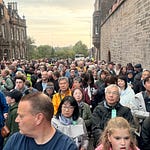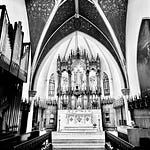This is Trinity Sunday, and the running joke in Episcopal churches is that they make the seminarian or junior priest preach today because no one else wants to risk being heretical. The Trinity is known for being something you can screw up theologically if you try to get too cute. If you get into some of it, classical Trinitarian theology is a little like reading a math textbook. Math was never my strong suit. And I will admit that I am not suited for such doctrinal intricacies.
But I am curious. And standing before something greater than we are—with limited knowledge but a lot of curiosity—is, I think, exactly what Trinity Sunday invites us to do.
So here’s what I’m offering this morning: a suggestion that the Trinity is not a formula to solve. The formula is what gets tricky: theology about a number – three – and another number – one. Instead, we can think of the Trinity as a performance to enter into. A living, ongoing, relational act that invites us to participate.
Since I was around 15 years old, I’ve been an actor. My parents might say I was an actor before then, but that’s the moment I remember – auditioning for a part in school and getting it. I played the Jester in a Madrigal dinner play at my junior high school.
Since then, and after hundreds of performances as an actor or director over thirty years, I’ve noticed something happens when a performance is really working. There’s a kind of dissolving between the elements. I’ve told my students and fellow artists: you can have a great script, but if the performance is off, it won’t do its work. Or a great performance in a weak play – enjoyable, but not transformative. You can even have a good show in front of the wrong audience – one that’s tired, restless, or unprepared for whatever you’re showing them – and the beauty might as well be a foreign language.
But if you’re in a place where all three things are in tune with each other, something lovely happens. The script is somehow heightened by the performance in the actor’s body and voice and that is somehow heightened in the brains and breath and imagination flowing among those watching. There’s a kind of singular, energetic transference that happens in such performances that is almost indescribable.
When I’ve been in such a presence, my brain is popping off like fireworks. My body is activated. I am leaning forward, engaged. Fully alive. And I am giving back to the performance in some way.
Polish director Jerzy Grotowski talked about this kind of transformation that happens when things are just right in performance. He envisioned a “holy actor” and a “holy audience,” where both are vulnerable, giving and receiving, breaking down the barrier between actor and spectator. When the audience is more fully engaged, the performance becomes a sacred act of mutual revelation — flowing back and forth between holy givers and receivers.
Holiness in the Trinity may be like this: an unending state of cooperation, of heightening and making each other, of beautiful and vulnerable relationship that isn’t defining but revealing. Where the play that unfolds is mutual and ongoing. We are called to partake in the performance as holy audience.
Anglican Theologian Sarah Coakley invites us to encounter this God not through analysis – not through figuring it out like a mathematician – but through participation – through prayer. In Coakley’s kind of prayer, our desires and God’s desires start to meet. Coakley describes this as something like a performance where we take on God’s character like a role in a play.
Today’s reading from Romans says the holy life builds such character. That’s a theatre word. Character. Something we step into. Something we inhabit with wiliness and playfulness. Something shaped by others who work in tandem with us.
So what does all this mean? For me: the Trinity isn’t only something we believe in — and certainly not merely something we are meant to figure out – it’s something we’re invited to live out, together. How might that work?
I have one small, very specific example.
Years ago, I took a class on Celtic Christian Spirituality and we were assigned to memorize St. Patrick’s Breastplate, an 8th-century Irish prayer. The actor in me loved this idea. Actors soak up the opportunity to memorize a script, to put it into our bodies. It’s about letting the words shape the breath, the rhythm, the body, even our ideas. It’s about letting the Word soak into our character.
Same reason we read the Psalms. Or recite the Creed. Or chant an anthem. When we take in the script – or Scripture – when our bodies are engaged, our imaginations awake, then the performance we’re invited into breaks forth. The actor becomes indistinguishable from the Holy Character they’re portraying.
That means we’re all actors of some kind.
For me, this prayer is an invitation to step into the character of God. I still remember it, parts of it, from time to time. Sometimes on days where I cannot tell what is going on right in front of me, where I’m lost in some other role, sometimes these words will rattle around in the back of my brain and I’ll remember the part I am called to play. Sometimes.
The part I remember is but a tiny fraction of the whole thing, but it goes like this:
I rise today
in power’s strength,
invoking the Trinity,
believing in threeness,
confessing the oneness,
of creation’s Creator.
Christ before me.
Christ behind me.
Christ above me.
Christ within me.1
That’s a good script for Trinity Sunday. And every day.
I’ll see you at the rehearsal.
Amen.
Note: The text and audio above is from a sermon delivered at Holy Trinity Episcopal Church in Fayetteville, North Carolina, based on readings for Trinity Sunday, Year C.
”Saint Patrick’s Breastplate,” Old Irish, eighth-century prayer. Prayer from Oliver Davies and Fiona Bowie, Celtic Christian Spirituality: An Anthology of Medieval and Modern Sources (SPCK, 1995).








